
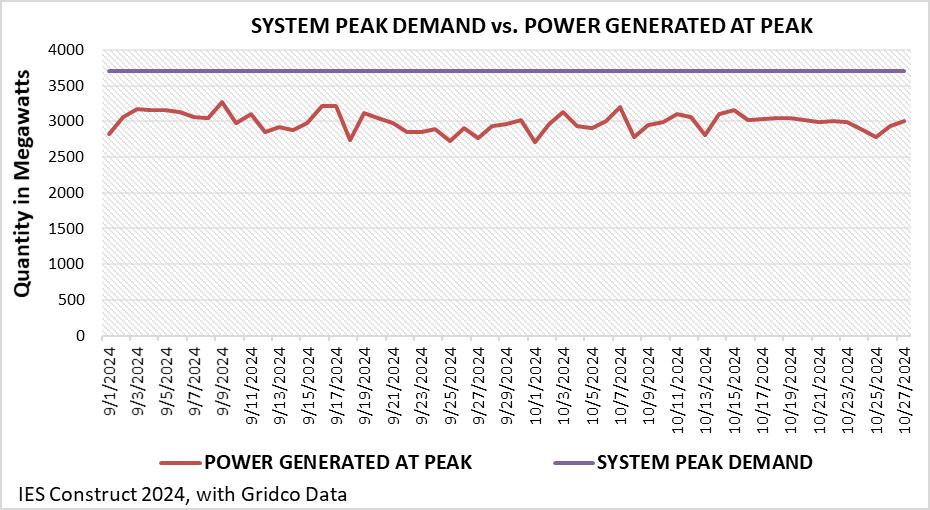



… forces Ghana to import from Ivory Coast
Gov’t wants to cut red tape, costs to spur rollout of 5G
Story on page 2
By Eugene Davis
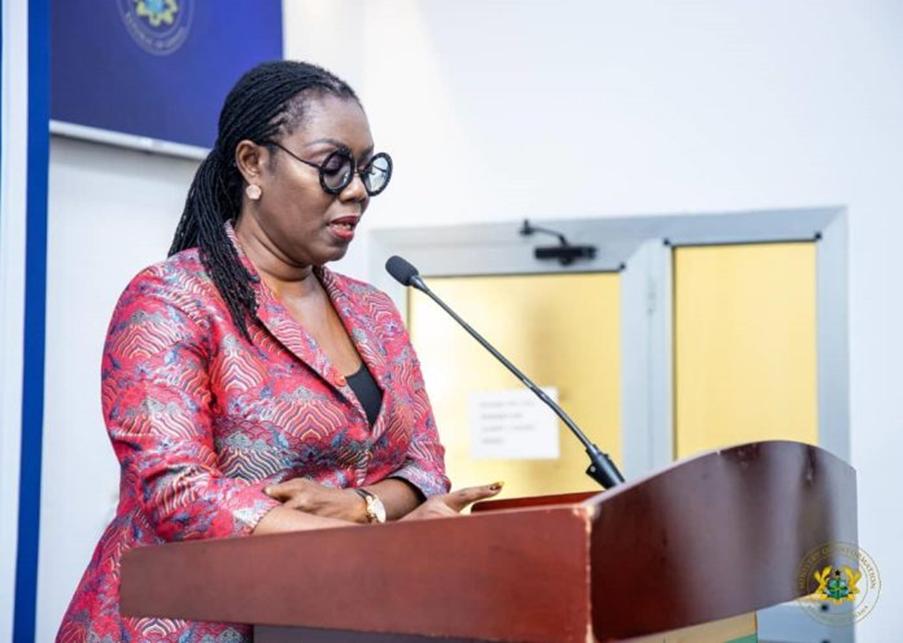
Ghana's trade ranking slips to 7th as infrastructure woes bite
Story on page 3
Generative AI is taking over – how Ghanaian businesses can harness the power of AI now!
Story on page 6

UBA reinforces commitment to long-term investments in Africa…set to expand operation in Middle East
Story on page 7




Copyright @ 2019 Business24
Limited All Rights Reser ved
Your subscription along with the suppor t of businesses that adver tise in Business24 -- makes an investment in journalism that is essential to keep the business community in Ghana wellinformed.
We value your suppor t and loyalty
Contact :
editor@business24 com gh
Newsroom: 030 296 5315
Adver tising / S ales: +233 24 212 2742


By Xatse Derick Emmanuel

Ghana's power generation de cit has consistently fallen short of daily system peak demand, impacting domestic energy stability and electricity export potential, forcing the country to import power from La Cote d’Ivoire, according to an analysis by the Institute for Energy Security (IES)
Generation versus demand alignment
Across the dataset, daily power generation regularly falls below the system peak demand of roughly 3700 megawatts (MW), with generation averaging around 3000 MW and thus missing the target by approximately 700 MW daily. This persistent shortfall suggests underlying issues, potentially rooted in generation capacity limitations, resource constraints, or operational policies that prioritize certain e ciency thresholds. Such shortfalls mean that Ghana faces daily challenges in ful lling its total energy requirements, which had led to practices such as load shedding or the prioritization of essential services over broader access.Patterns and anomalies in demand satisfaction
The dataset consistently shows that generation remains below demand without any instances of excess power generation. While rare, certain days (like October 7, 2024) do show generation levels approaching peak demand, indicating that Ghana’s power infrastructure may have the potential for marginal increases under speci c conditions. However, these instances are sporadic and highlight the lack of signi cant exibility in the current power generation framework. This pattern points to the country’s inability to
convert a signi cant dependable capacity (close to 5,000 MW) to actual generation capacity due to forced plant shutdowns, fuel supply constraints, and debt issues et cetera, thus limiting the performance of existing infrastructures.
Magnitude and frequency of shortfalls
The frequency and magnitude of generation falling short of peak demand are striking. The system fails to meet demand every day in the dataset, with shortfalls generally ranging from 700 to 1000 MW. Such a recurring gap suggests structural challenges in Ghana’s electricity generation capacity. This continued discrepancy impacts the country's ability to sustain reliable electricity exports, as limited domestic supply necessitates the re-allocation of resources meant for export to satisfy local demand.Fluctuations in power generation
While Ghana’s power generation shows some day-to-day uctuations, they remain within a relatively narrow band (2700 to 3200 MW). The narrow range of these uctuations implies a stable, albeit limited, generation framework that lacks the exibility to rapidly scale production up or down based on daily demand variations. This stability, while
cates constraints in the system’s ability to dynamically respond to shifts in both peak demand and export opportunities, which hampers operational e ciency and responsiveness.
The relationship between power generation levels and export quantities underscores the limitations in Ghana's ability to reliably serve external markets such as Togo, Burkina Faso, Benin, and La Cote d’Ivoire. Exports generally uctuate between 100 and 400 MW and seem positively correlated with days when generation is closer to peak demand. However, the shortfalls in meeting domestic demand necessitate prioritizing local consumption, often resulting in reduced export volumes. This trend suggests that while exports are still maintained, they are subject to reductions to stabilize Ghana’s internal electricity needs. The data shows a gradually declining trend in exports to the neighbouring countries over the period analysed. The frequent adjustments to export levels may a ect Ghana’s trade relations with neighbouring countries, as the inconsistency could in uence these partners' energy security and planning.Detail of power exports to the neighbouring countries over the period analysed shows an interesting pattern at a certain point. Between 12th and 17th September 2024 power exports to CIE of La Cote d’Ivoire were curtailed, while exports to Togo-Benin (CEB), and Burkina Faso (SONABEL) were reduced drastically; to accommodate reduced power generation. Between 18th September 2024 and 7th October 2024 a total of 1,605 MW of power were forced to be imported from La Cote d’Ivoire (CIE) particularly during the day,
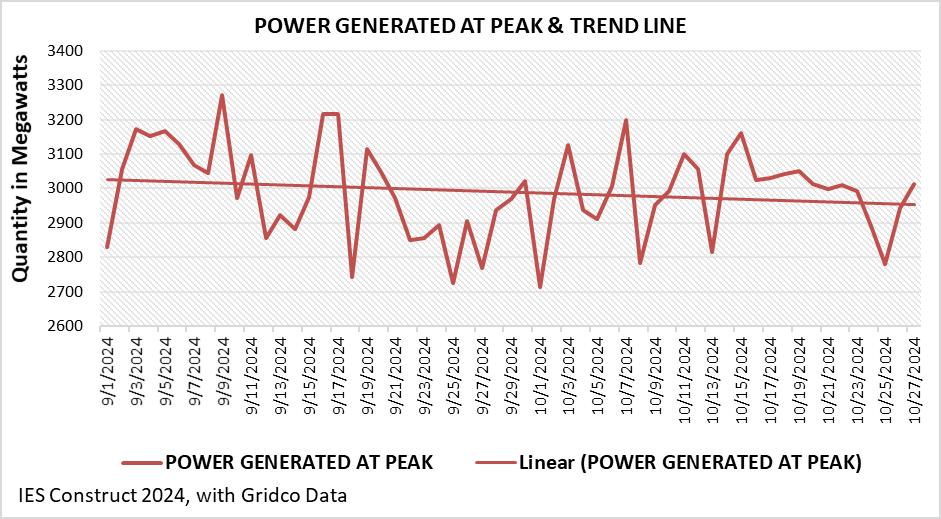

contrary to the norm, to augment Ghana’s growing electricity demand within the period.
Summary and implications
Ghana’s current power generation pro le indicates a consistent inability to meet daily peak demand, limiting both domestic electricity supply reliability and export stability. The data points to a need for strategic adjustments to either expand generation capacity, fully utilize existing dependable capacity, or implement demand management initiatives to close the gap between generation and demand. Moreover, the limited exibility in the generation system suggests a necessity for operational enhancements that could enable more dynamic responses to daily demand uctuations.
Recommendations
To address these issues, Ghana may consider expanding generation capacity through investments in new facilities, upgrades to existing ones, and enhanced utilization of existing dependable capacity to help bridge the demand-supply gap. Also, the country can be implementing policies to optimize and manage peak demand more e ectively, such as through demand
response programs to help balance consumption with available resources. To sustain export commitments, Ghana could equally explore bilateral agreements with neighbouring countries that account for supply constraints, ensuring reliability while accommodating domestic needs.
By Xatse Derick Emmanuel
Conclusion
Ghana’s power generation consistently falls short of its peak demand, which is set around 3,700 MW daily. With generation averaging about 3,000 MW, there
is a daily shortfall of approximately 700 MW, sometimes reaching up to 1,000 MW. This gap, occurring 100% of the time in the dataset, points to structural issues in scaling up or resource availability for power generation. Due to this sustained shortfall, Ghana faces challenges in meeting domestic demand reliably and ful lling export commitments, impacting revenue from energy exports. The generation system shows moderate daily uctuations, indicating limited exibility to adapt to demand changes, which restricts the
capacity to meet peak demand or seize export opportunities. To prioritize domestic needs, Ghana often reduces export volumes (and import at some point), a ecting trade relations and income from exports to neighbouring countries. The analysis underscores the importance of enhancing the utilization of existing dependable capacity, expanding generation capacity to meet medium term needs, and adopting exible operational policies to enhance electricity supply reliability and support Ghana’s role as a regional energy exporter.
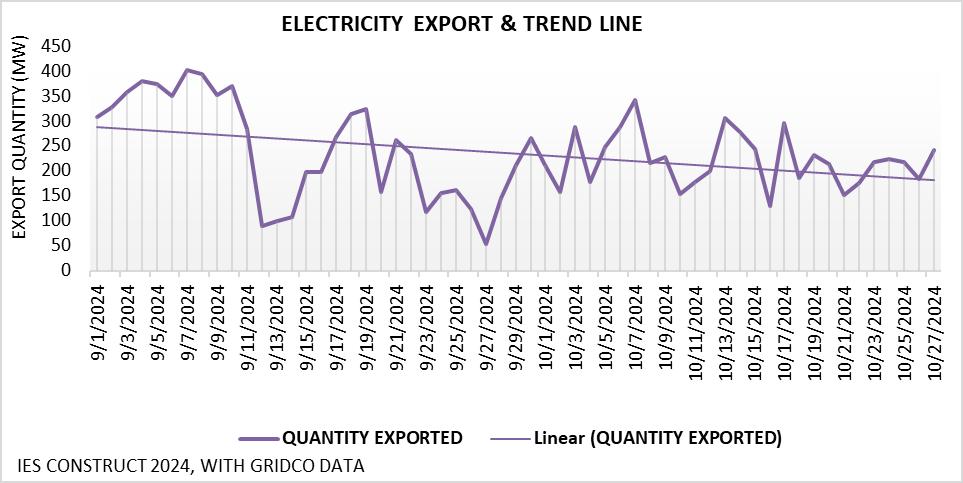
By Eugene Davis

The Minister of Communications and Digitalisation, Ursula Owusu-Ekuful, has indicated that the government wants to cut red tape and costs to help mobile network operators roll out fast-speed 5G, ensuring it is a ordable.
According to her, the Ministry is committed to ensuring that 5G bene ts all Ghanaians, regardless of location, especially the rural areas, and is partnering with telecom providers to o er a ord-
able data plans and explore public-private partnerships to further reduce costs.
Speaking at the launch of the 5G technology in Accra last Friday, she said “A ordability is a priority in our 5G rollout plan. We are collaborating closely with telecom services providers to o er a ordable data plans catering to various needs and budgets. Additionally, the government is exploring public-private partner-
ships to reduce consumer costs. Through these e orts, we aim to make 5G accessible to businesses, small enterprises, students, urban residents, and low-income households. Our goal is to create a digital ecosystem where high-speed connectivity is within the reach of everyone.”
Learning from past challenges, she noted that the government is adopting a shared neutral wholesale network model for 5G, granting Next Generation Infrastructure Company (NGIC) a 10-year exclusivity to build 4G/5G infrastructure for all operators. This model, she explains fosters fair competition based on service quality rather than network coverage. “If you live in an initial 5G area and lack access by December, your network provider should address it.”
As part of rural inclusion strategy, government has developed an initiative to subsidise infrastructure costs in underserved areas and are working with its partners to leverage satellite and wireless solutions, which are often more feasible for rural deployment.
“Our Universal Service Fund, managed by GIFEC, is now largely dedicated to rural connectivity projects, reinforcing our commitment to digital equity. This approach will deliver fast, reliable 4G and 5G services to communities that have traditionally faced connectivity challenges.”
Under the shared network model, mobile network operators the Minister posited, will lease capacity from Next Generation Infrastructure Company (NGIC) thereby sharing network operational costs rather than each investing in separate builds.
Further stating that the move aims to spread costs more equitably and reduce service prices for users, while also ensuring nationwide rollout beyond commercially viable urban centres.
Ms. Owusu-Ekuful also argued that the potential of 5G extends beyond mere incremental improvements; “it is a revolutionary leap forward that promises to rede ne connectivity, productivity, and overall quality of life.
With its unparalleled speed, low

latency, and enormous capacity, 5G has the potential to drive innovations in every sector—agriculture, health, transport, manufacturing, and beyond. The Internet of Things (IoT), arti cial intelligence (AI), and smart cities are no longer futuristic concepts but imminent realities ready to transform our ways of living and working.”
To address data security concerns, the Minister assured that Ghana’s 5G network has been designed in line with international cybersecurity standards.
“The 5G network is built with global best practices, embedding data protection, cybersecurity, and network security measures. Just as our 4G network is secure, so is the 5G,” she stated.
The arrival of 5G in Ghana marks a major milestone in the country’s digital journey. The initial rollout will focus on major cities, with residents in Accra, Kumasi, and Takoradi among the rst to experience its bene ts once network operators activate the service.
The government aims to expand coverage to additional urban
areas by the end of 2024, with a target of achieving nationwide access, including rural areas, by 2026. This phased approach ensures careful deployment aligned with infrastructure readiness and quality standards.
The Minister also announced the construction of a Digital Youth Hub at the University of Ghana, designed to foster the development of Ghana-speci c 5G applications across key sectors. The high-speed shared network is expected to accelerate innovation, with plans to replicate this initiative on other campuses.
With the rollout of 5G, Ghana joins over 10 African nations leading the continent's digital transformation. Initially, the network will launch in ve regions—Accra, Ashanti, Eastern, Volta, and Central—with plans to expand to other regional cities soon.
The fth generation of wireless technology, 5G, promises signicantly higher internet speeds, faster data transfers, and improved network reliability compared to previous generations.
It is expected to deliver up to 10
times the speed of 4G Plus services, marking a major upgrade in connectivity. Enhanced capacity and lower latency will enable faster downloads and more consistent performance across industries.
The initiative, designed to provide a ordable high-speed mobile broadband across Ghana, is expected to drive digital transformation, particularly in areas such as healthcare, education, and nancial services.
The 5G license has been awarded to Next Gen InfraCo NGIC, a newly created shared infrastructure company co-promoted by the government and a consortium of rms, including Ascend Digital, K-NET, Radisys, Nokia, Tech Mahindra, AT Ghana, and Telecel Ghana.
The collaborative e ort is expected to deliver cost-e ective 5G services across the country, ensuring broader access to next-generation mobile connectivity.

Ghana faced a decline in its overall trade ranking, falling from 3rd to 7th among 10 African countries evaluated in the latest Standard Bank Africa Trade Barometer (SB ATB) report.
The report shows that Ghana’s trade environment is grappling with mounting challenges, even as con dence within the business community shows a surprising lift.
This shift highlights emerging hurdles, particularly in government support for trade and infrastructure, which are critical for Ghana’s market competitiveness.
The 4th edition of the report indicates that local businesses perceive a dip in government support, primarily due to in ation, high taxes, and foreign exchange constraints. The report also points to infrastructure constraints, notably in power and transportation, as ongoing barriers to business growth. While digital nancial services are growing rapidly in Ghana, particularly for cross-border transactions, access to sucient foreign currency liquidity remains a substantial barrier for traders.
Approximately 83% of surveyed businesses in Ghana cited limited foreign currency availability as a key concern, re ecting broader market strains amidst uctuating currency values.
Despite recent challenges impacting its competitive positioning across Africa, Ghana’s business con dence index saw a signi cant
boost, rising from 47 to 55. This increase re ects local optimism about potential economic growth and improved forecasts for 2024-2025.
The 10 countries covered by the Standard Bank Africa Trade Barometer are AfCFTA signatory nations, representing 66% of Africa’s gross domestic product (GDP) and 45% of the continent’s
population.
Tanzania improved its ranking from 8th to 4th, Mozambique from 4th to 3rd, Nigeria from 6th to 5th, and Zambia from 9th to 8th.
Uganda fell from 7th to 9th and Kenya from 5th to 6th. Meanwhile, South Africa, Namibia, and Angola held steady in their rankings at 1st, 2nd, and 10th, respectively.


Government at the just ended treasury bill auc�on announced a set target of GH¢4,035.00 million across the 91, 182 and 364-day bills. However, total bids amoun�ng to GH¢4,195.32 million was received and accepted represen�ng a 3.97% oversubscrip�on of GH¢160.32 million


Following the total bid oversubscrip�on, the week-on-week yields also soared further, at least more significantly than the previous week’s increase , witnessing an upward reac�on of 32.62bps, 12.63bps a nd 15.57bps increases across the 91-, 182- and 364-day bills respec�vely.

T-bills: Government to borrow GH¢3,980.00 Million this week across the 91, 182 and 364 day bills to cater for maturi�es totaling circa GH¢3,540.00 Million
Shares: MTN Ghana Sha res c on�nue to dominate GSE equity market trades despite a no price change to close the week at GHS2.15 per share. GLD shares on the other ha nd is the bigge st gainer with a price increa se of G H¢27.81 to close at GH¢423.81 per share
Mutual Fund: NTHC Horizon Fund reports a Year-To-Date (YTD) performance of 32.18% and a Net Asset Value (NAV) growth of 40.44% for the week ending O ctober 18, 2024
Economy
Cedi now selling at G H¢16.55 to a dollar at major forex bureaus
Ghana’s fiscal deficit to GDP to end 2024 at 4.2% - World Bank.


Generative AI is revolutionizing industries across the globe, and Ghanaian businesses are no exception. If your company hasn’t yet tapped into the transformative power of Generative AI, you might be missing out on a signi cant competitive edge. From enhancing customer service to streamlining operations, AI technologies like Microsoft’s Copilot are reshaping the future of work. Introduced in late 2022 with OpenAI’s ChatGPT and integrated into Microsoft 365 in 2024, these AI tools are helping businesses worldwide operate smarter, faster, and more e ciently.
1. Enhancing customer experience with Generative AI
Personalized customer interactions
Today’s consumers expect personalized and seamless experiences from the brands they interact with, and Generative AI delivers this at scale. AI-powered chatbots can engage customers around the clock, providing instant answers, product recommendations, and handling complex queries—all without human intervention. In Ghana, where excellent customer service can set a business apart, deploying AI-driven chatbots can signi cantly boost customer satisfaction and loyalty.
Imagine a retail business using AI to analyze customer preferences and automatically generate targeted promotions. An AI chatbot could guide customers through their shopping journey, recommending products based on their browsing history and past purchases. This level of personalization improves the customer experience and drives higher sales, turning casual visitors into loyal customers.
Enhanced customer service with AI integration
Generative AI tools like Copilot Studio or Azure OpenAI are enhancing customer service by automating routine interactions. Unlike traditional customer service agents, AI-driven chatbots don’t need breaks or rest and can provide consistent support every time. Customers bene t from faster response times and more accurate information, while businesses save on the costs associated with hiring and training large support teams.
For instance, a telecom company in Ghana could deploy AI chatbots
By Allen OLAYIWOLA
to handle common queries like data bundle purchases or account balance checks, freeing human agents to focus on more complex issues. This not only enhances the e ciency of the service but also improves customer satisfaction.
2. Streamlining operations and boosting e ciency
Automating routine tasks with AI
Generative AI is not just transforming customer interactions; it’s revolutionizing how businesses operate internally by automating repetitive tasks. From generating reports and drafting standard emails to data entry, AI tools like Microsoft’s Power Automate can handle these tasks faster and more accurately than humans, freeing employees to focus on higher-value work.
In Ghana, where many businesses struggle with resource constraints, AI-driven automation can be a game-changer. For example, a nancial institution could use AI to automate the generation of daily transaction reports, allowing analysts to spend more time on strategic activities rather than mundane tasks. This enhances productivity and ensures that resources are used where they can make the most impact.
Data-driven decision making
Generative AI also enhances data analytics by processing vast datasets with unprecedented speed and accuracy. Businesses in Ghana can leverage AI to make more informed decisions, react quickly to market changes, and allocate resources more e ciently. For example, an agribusiness could use AI to analyze weather patterns and market trends, helping farmers decide the best time to plant and sell their crops. This kind of insight was previously only available to large corporations with dedicated data teams, but AI is democratizing access to these powerful analytics.
3. Driving innovation in product development
Accelerating design and prototyping
Generative AI is proving to be a valuable partner in innovation, helping businesses develop and re ne products faster than ever. By generating initial designs and prototypes, AI speeds up the development cycle, reducing costs and time to market. In industries like fashion and manufacturing, AI can suggest design improvements, simulate
outcomes, and create 3D models based on simple prompts, allowing businesses to iterate quickly and e ciently.
For instance, a local tech startup could use AI to rapidly prototype new app interfaces, testing di erent designs to nd the most user-friendly option. This approach not only saves time but also improves the nal product by incorporating AI-driven insights into the development process. Solving problems creatively Generative AI isn’t just about automating tasks—it’s also a powerful tool for creative problem-solving. Businesses can use AI to brainstorm solutions to complex challenges, generating multiple approaches that teams can evaluate and re ne. This collaborative approach boosts innovation, leading to better products and services that meet market needs.
For example, an energy company in Ghana could use AI to explore new strategies for improving grid e ciency, testing various scenarios to nd the most e ective solution. By incorporating AI into the problem-solving process, businesses can achieve breakthroughs faster and more reliably.
Preparing your business for the AI revolution
To harness the full potential of Generative AI, Ghanaian businesses need to ensure their data is well-organized, accurate, and accessible. High-quality data enhances AI’s e ectiveness, leading to more precise outputs and better decision-making. Investing in data management and cybersecurity is crucial, as AI also introduces new risks, such as sophisticated phishing attacks or data misuse.
Microsoft’s Copilot provides an accessible starting point for integrating AI into your business. By incorporating AI into familiar tools like Excel and Word, Copilot allows companies to boost productivity without a steep learning curve. However, the greater opportunity lies in developing custom AI solutions that address your speci c business challenges.
Conclusion: embrace Generative AI and lead the future
Generative AI is more than a technological trend—it’s a transformative force that can elevate every aspect of your business. From
enhancing customer experiences to streamlining operations and driving innovation, AI empowers Ghanaian businesses to compete on a global scale. The time to act is now. By adopting AI, training your teams, and integrating these technologies into your daily operations, you can unlock new levels of e ciency and growth.
Don’t wait for your competitors to take the lead. Embrace Generative AI today and position your business at the forefront of the digital revolution. With the right strategy, AI can turn your biggest challenges into your greatest opportunities.
If you'd like to explore how these strategies can help your organization thrive, reach out to discuss tailored solutions for your business growth journey.
>>> Allen Olayiwola is a seasoned cloud architect and systems administrator with expertise in leading technical teams to create innovative platforms. As CTO of eSolutions Consulting, he has spearheaded major projects like the O ce 365 rollout for Ghana’s government and infrastructure deployment for the Ghana Revenue Authority. Recognized for his strategic use of emerging technologies, Allen has led his team to multiple Microsoft Partner of the Year awards, solidifying his role as a key leader in tech-driven business transformation. He can be reached via allen@esolutionsghana.com and or 0540123034



Africa’s Global Bank, United Bank for Africa (UBA) Plc, has set the wheels in motion to expand its operations in the Middle East with plan ongoing to open a subsidiary in Saudi Arabia, its largest economy.
This move which is expected to happen within the next year will mark the bank’s second subsidiary in the Gulf Region, following the expansion of its business to the United Arab Emirates in 2022. UBA’s Group Deputy Managing Director, Muyiwa Akinyemi, who disclosed this during a panel session during the 8th Edition of the Future Investment Initiative(FII) in Riyadh, Saudi Arabia and in an interview with Arise TV, underscored the bank’s strategic commitment towards fostering Africa’s growth through infrastructure development, youth empowerment, and sustainable partnerships across key global markets.
He said, “Opening a presence in Saudi Arabia represents the next step for us in connecting the Africa-Gulf region. We are excited to bring UBA’s expertise in nancial services to Saudi Arabia, where we aim to facilitate knowledge transfer and create strong economic linkages. This venture will further enable us to access
Saudi expertise in food security, energy transition, and sustainable practices, which are all critical for Africa’s continued development.”
While emphasising the importance of Africa as a strategic investment destination for long-term capital, he said, “Africa’s infrastructure de cit is an opportunity for investors worldwide. Our pitch to the Gulf and Southeast Asia emphasizes that Africa must be part of their investment horizon. Today, food security is paramount as our population expands.
Akinyemi also highlighted the bank’s dedication to nurturing Africa’s youth talent through entrepreneurship. “Guided by our Group Chairman’s e orts with the Tony Elumelu Foundation, UBA is committed to supporting young entrepreneurs in tech, agriculture, and entertainment, which are all burgeoning sectors in Africa. With such a young and dynamic population, we see enormous potential for innovation and growth.”
He also reiterated the bank’s continuous support for Small and Medium Enterprises (SMEs) in Africa and beyond as he outlined the bank’s commitment to these businesses, which he referred to
as key players in the African economy and vehicles for employment and economic growth.
“SMEs are the backbone of economic development in Africa. They contribute signi cantly to job creation and value chains, particularly within Nigeria. Over the last year, UBA has committed billions to support SMEs across Africa, and our network of over 20 countries enables us to make a substantial impact.”
During the panel discussions, Akinyemi took time to emphasize UBA’s longstanding experience on the continent as it navigates an ever-evolving investment landscape, adding that “As investors, we focus on infrastructure and sustainable projects that encourage economic prosperity while addressing pressing issues such as talent migration. Our goal is to ensure that people can thrive in Africa without needing to relocate. By investing in local talent and fostering growth sectors, we contribute to building the next generation of global innovators right here in Africa.”
The DMD further articulated UBA’s approach to risk management on the continent, emphasizing that the bank’s 75-year history has uniquely equipped it with
insights and strategies to navigate diverse markets.
“With over seven decades of experience, Africa is what we know, and that knowledge allows us to manage risks e ectively. We see tremendous opportunities in various sectors across the continent, and our continued investments are driven by a commitment to bring economic empowerment to communities, increase GDP, and improve socioeconomic quality. Our anniversary is a celebration of UBA’s legacy of contributing to Africa’s progress. We look forward to leveraging this milestone to drive even greater impact across sectors and empower future generations,” he said.
United Bank for Africa Plc is a leading Pan-African nancial institution, o ering banking services to more than forty- ve million customers, across 1,000 business o ces and customer touch points in 20 African countries. With presence in New York, London, Paris and Dubai, UBA is connecting people and businesses across Africa through retail, commercial and corporate banking, innovative cross-border payments and remittances, trade nance and ancillary banking services.
Emirates has today announced the return of its popular My Emirates Pass, allowing passengers to enjoy exclusive o ers at hundreds of locations in Dubai and the UAE. Starting from 1st November 2024 to 31st March 2025, My Emirates Pass enables customers to use their boarding pass to enjoy incredible discounts at restaurants, family days out, tranquil spa treatments, luxury shopping outlets, private pools and much more.
Emirates customers ying to or through Dubai can simply show their boarding pass and a valid form of identi cation to unlock incredible o ers to some of the world’s most iconic attractions including At The Top Burj Khalifa, IMG Worlds of Adventure and Aquaventure Waterpark. To see all My Emirates Pass o ers, please visit: emirates.com/my-emirates-pass
Complimentary Access to Cultural Attractions
In addition to over 600 exclusive o ers and discounts for retail, leisure, dining, renowned attractions, and luxury spas, passengers this year will also receive complimentary access to the Vision Pavilion and Expo Museum at Expo City for the season.
Dubai Shopping Festival 30th Anniversary
This year sees the acclaimed Dubai Shopping Festival proudly celebrate its 30th anniversary, with a host of A-list performers, exclusive experiences and unforgettable entertainment lined up to mark the occasion. The festival will run from 6th December 2024 to 12th January 2025 across the city, o ering a month packed full of unmissable retail o ers. While there, Emirates customers can use their boarding pass to enjoy exclusive o ers at restaurants,
spas, pools, family attractions and more.
Take Advantage of Some Winter Sun in Dubai
Whether it’s indulging in world-famous hospitality o erings, unwinding on a sun-soaked beach or immersing yourself in the festive celebrations, Dubai o ers a host of iconic experiences and attractions for every traveller.
• MR - Dubai Experience: Customers can browse, create and book their own customised itineraries including ights, hotel stay, visits to key attractions, and other dining and leisure experiences in Dubai and the UAE, through Emirates’ Dubai Experience platform, and enjoy even more unique bene ts.
• GL - Skywards Partners: Members of the award-winning loyalty program, Emirates
Skywards can earn Miles with our worldwide partners like hotels, airlines, car rentals, retail and banking. Members can spend these Miles on reward tickets, upgrades, or even tickets for concerts and sports events. Learn more about Emirates Skywards here: https://www.emirates.com/english/skywards/. While in Dubai, you can earn Miles with our partners across the city like Dubai Mall, Arabian Adventures, Emirates Holidays and more.
• MR - Emirates Holidays/Vacations: Customers can book their holiday to Dubai through Emirates Holidays. All Emirates Holidays include exible booking options. Whilst for even more peace of mind, Emirates Holidays’ dedicated 24/7 On Holiday Service team will be there to support holidaymakers for every moment that they’re away. When you book your
holiday with Emirates Holidays, you receive bonus Miles on top of the Miles you would receive for your ight.
Emirates o ers ights to more than 140 destinations around the world, across six continents and currently operates 7 ights per week from the Kotoka International Airport, Accra to Dubai.
For more information, visit emirates.com. Tickets can be purchased on emirates.com, Emirates call centre and retail o ces, via travel agents or through online travel agents.


Choosing the right resort for your vacation can signi cantly elevate your overall experience, when it o ers a blend of luxurious amenities, exceptional service, stunning locations, diverse dining options, and a serene ambiance. Without a doubt, staying at a great resort has become the preferred choice for travelers seeking convenience, relaxation, and memorable getaways.
That is what Marlin Resort, a leading African resort best known for its luxury, modern facilities and serene environment located in Ghana o ers its clients. Guests at Marlin Resort are presented with an escape to paradise, where luxury meets tranquility accompanied by breathtaking ocean views, world-class amenities, and unforgettable experiences. In addition is the tranquil atmosphere that enhances the vacation experience for guests.
Marlin Resort is located within the heart of Gomoa Fetteh, a coastal town in the Central Region of Ghana. It is approximately an hour drive away from the country’s business center, Accra and the Kotoka International Airport. Under the management of its visionary Founder, Albin Akansake, a Freight Executive and Tax Accountant by training, Marlin Resort is fast becoming a resort of choice across the West African coast.
In an interaction with Mr. Akansake at his beautiful seafront property in a pristine coastline, he revealed the motivation for establishing the resort which centered on creating a facility which will provide guests with an experience supreme to the various o erings by leading resorts across the West African coast. He further indicated his intentions to position Marlin Resort as a top tier resort for continental glory.
“The hospitality industry in Africa is experiencing a boom like never before, from luxury resorts on the Indian Ocean coast to boutique hotels in bustling urban centers, the continent is rapidly becoming a global hotspot for tourism and business travel. As more international brands invest in Africa and local businesses expand, there are unending opportunities within the sector and that drives my motivation for establishing Marlin Resort with the vision to position it as the best on the continent”, he stated. Mr. Akansake further added that “we have heard and seen the world focus its attention on all-inclusive resorts being the ultimate holiday destinations with o erings generally including lodging, unlimited food and drink, drinks, entertainment, and other recreational activities. These destination resorts also provide tness programs, spas and in some instances shopping. Their advantage is that guests do not have to leave the resort after arriving and that is the vision for Marlin Resort”.
Marlin resort is an all-inclusive resort which currently has hundred (100) rooms, from standard rooms to Presidential and Ambassadorial suites, accompanied by three (3) conference halls, all equipped with the state of the art equipment and can host up to three hundred (300) guests. There are ve (5) restaurants of international standard with various unique cuisines. The resort has multilingual employees to ensure there is no language barrier for non-English speaking guests. International guests ying into the country are welcomed at the Marlin Welcome Desk at the Kotoka International Airport and chau eured to the resort in a vehicle of their choice. The various activities and facilities available for
guests includes an In nity Pool, Ocean with a clean beach, Quad Biking, Horse Riding, Board and Card games, Valet Park Mini Digital Golf Club, Tennis Court and free Wi-Fi.
There is a VIP lounge to provide
guests who prefer ultimate exclusivity, privacy and luxury with an out-of-this-world experience. It is located on the topmost oor of the resort where guests will literally be looking down on the world and the oceans in a lavish manner
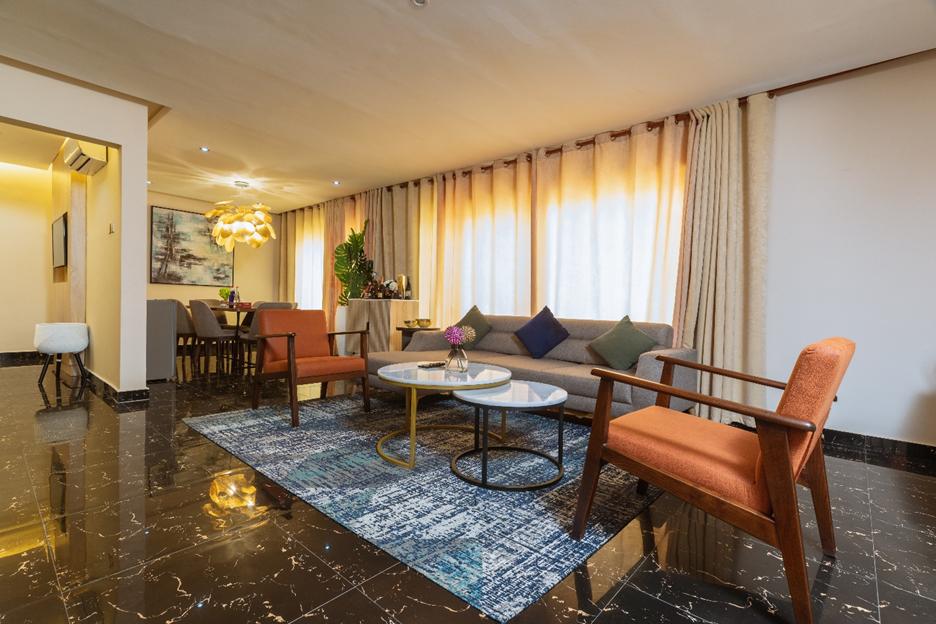



coupled with the meticulous detailing and privileged cuisine.
The resort has a plush beachside lawn which o ers the perfect location for parties, weddings and any other events. The ocean view provides a picturesque backdrop to really elevate the bliss of your event and the guests will relish the ocean breeze and sounds of rushing waves and the magni cence of our beautiful lush green lawn. In addition, there is a doctor on call and a twenty-four (24) hour in-house clinic.
Story by Chris Koney
Chris is a thought leader in Mar keting Communications, Stake holder Relationship Management Professional and International Cooperation Specialist. Over the last fteen (15) years, he has made tremendous impact within Africa’s corporate communications and creative arts sectors. He can be reached at chriskoney@gmail.com / +233 20 854 1480.

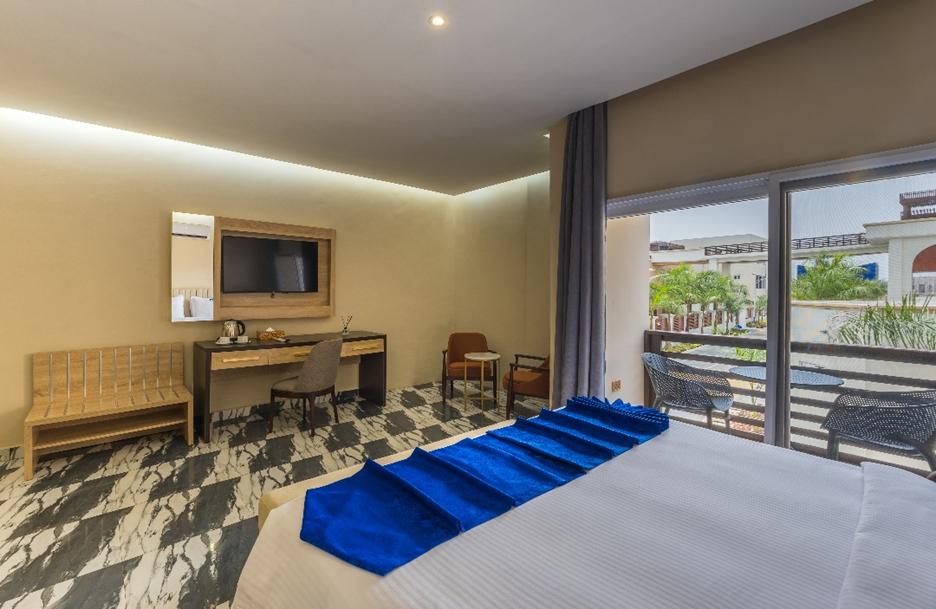
On Wednesday 30 October 2024, in a month which globally is recognised as cybersecurity month, PwC, a professional services rm, organised a cyber forum on the theme Leadership strategies for cyber resilience and growth.
The forum discussed leading topics including cybersecurity as a business priority, leadership driving cybersecurity, organisational preparedness for cyber incidents, investing in technology and people, and measuring and continuous improvement within cyberspace.
Key stakeholders and industry experts in attendance were Chief Technology O cers, Chief Information Security O cers, Chief Risk O cers, Chief Finance O cers, other top executives responsible for cybersecurity strategy and governance, within the nancial services, telecommu-
nications, and energy industries, as well as government agencies in Ghana.
The event featured a distinguished panel of resources from industry and regulators including Mr. Stephen Cudjoe-Seshie (Cyber Security Authority Lead, National CERT-GH), Jacqueline Hanson-Kotei (Security Head for MTN Ghana), Mr. Abel Lomotey Daitey (Chief Information O cer, GCB Bank PLC), Marco Loots (Director, Cybersecurity, PwC), and Clement Yayra Tettey (Senior Manager, Cybersecurity, PwC). The panel delved into discussions on an overarching theme of achieving cyber maturity; strategies for enhancing organisational cyber resilience.
Clement Yayra Tettey’s keynote, addressed technologies like GenAI, Cloud Technology (multi-cloud or single), connected products, Operating Technology
(OT) and quantum computing. Mr Tettey noted that these recent technologies impact the cyber attack surface, both positively and negatively, as they are also used by cyber criminals in their nefarious activities. He charged business leaders to include technology and cyber leaders in their organisations in strategic decisions, to help anticipate problems posed by cyber criminals and properly bolster the cyber resilience. He further encouraged business and cyber leaders to collaborate and position cybersecurity as a competitive edge. He mentioned that the ndings of the 2025 Global Trust Digital Insight report from PwC put customer trust, brand integrity and loyalty, business growth and opportunities, staying ahead of business disruption, leadership in the market, and public relations at the heart of cybersecurity and trust.
The forum wrapped up with calls to action to all stakeholders to collaborate cohesively to align business and cyber priorities, empower CISOs to be involved in strategic planning of cybersecurity measures, and invest in resilience by taking a holistic approach to integrate people, processes, and technology.
In conclusion, PwC noted, in particular, that business leaders at c-suite and board levels should make a deliberate e ort to work with their cyber leaders to utilise cybersecurity as a competitive advantage to foster customer trust within the industries they operate in.
To access the report, and read the ndings from the 2025 Global Digital Trust Insights Survey, please visit https://www.pwc.com/us/en/services/consulting/cybersecurity-risk-regulatory/library/global-d igital-trust-insights.html
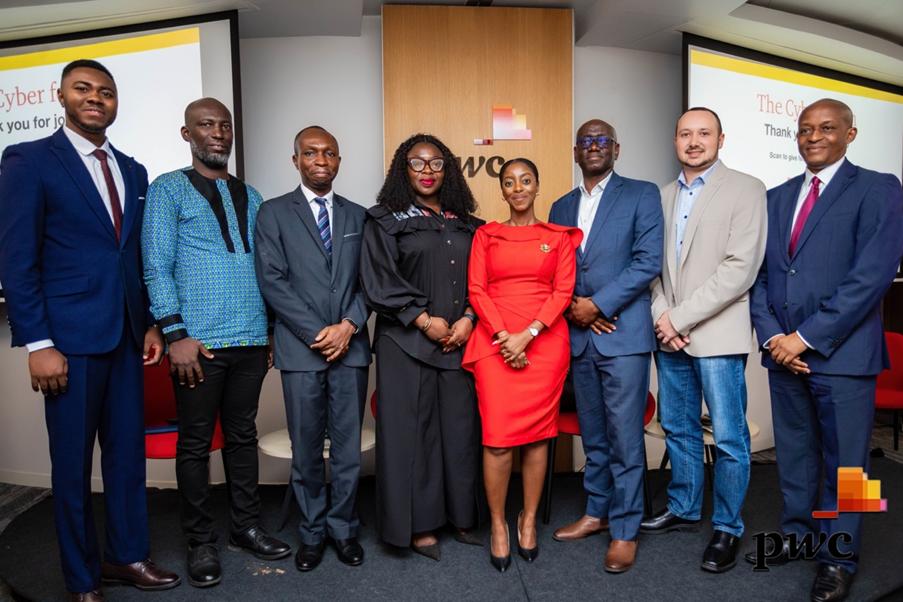


W
The Ghana Stock Exchange closed higher this week on the back of price increases by 3 counters.
The GSE Composite Index (GSE-CI) gained 0 77 points (+0.02 %) for the week to close at 4,347.47 points, reflecting a year-to-date (YTD) gain of 38.89% The GSE Financial Index (GSE-FI) remained flat for the week to close at 2,203.38 points (0.00%), reflecting a year-to-date (YTD) gain of 15 87%
Market capitalization inched up by 0 09% to close the week at GH¢99, 054.59 million, from GH¢98,964.42 million at the close of the previous week. This reflects a YTD gain of 34.05%.
The week recorded a total of 1,455,234 shares valued at GH¢13,965,256.93, compared with 1,114,611 shares, valued at GH¢14,296,225.56 traded in the preceding week.
MTNGH dominated the volume of trades while New Gold Exchange Traded Fund dominated the value of trades for the week accounting for 89.80 % and 78 87% of the volume and value of shares traded respectively.
The market ended the week with 3 advancers, as indicated in the table below
GSE CI GSE FSI
YTD Performance of GSE Market Indices
GSE CI GSE FSI1,000,000 2,000,000 3,000,000 4,000,000 5,000,000 6,000,000 7,000,000 8,000,000 9,000,000
Volume and Value of Trades for Week Ending 18/10/2024















The Cedi continued its depreciation run for the second straight week It traded at GH¢15 9900/$, compared with GH¢15.7900/$ at week open, reflecting w/w and YTD depreciations of 0.56% and 25.70% respectively. This compar es with a loss of 24.91% a year ago.
The Cedi also depreciated against the GBP for the week. It traded at GH¢20.8422/£, compared with GH¢20.7885/£ at week open, reflecting w/ w and YTD losses of 0.26% and 27.39% respectively. This compares with a depreciation of 25.63% a year ago.
The Cedi inched up marginally against the Euro for the week It traded at GH¢17 3700/€, compared with GH¢17.4049/€ at week open, reflecting w/ w gain and YTD depreciation of 0.20% and 24.43% respectively. This compares with a depreciation of 24.35% a year ago.

The Cedi lost grounds against the Canadian Dollar for the week It opened at GH¢11 5530/C$ but closed at GH¢11.5867/C$, reflecting w/w and YTD losses of 0.29% and 22.23% respectively. This compares with a depreciation of 24.15% a year ago.




Source: Bank of Ghana

Ghana Market Summary
Source: Bank of



The government raised a sum of GH¢4,195 32 million for the week across the 91 -Day, 182-Day and 364-Day Treasury Bills This compared with GH¢4,613.93 million raised in the previous week.
The 91-Day Bill settled at 25 94% p a from 25 62% p a last week whilst the 182 -Day Bill settled at 27 03% p a from 26.90% p a last week The 364Day Bill settled at 28 74% p.a from 28 58% p a last week
The tables below highlight primary market activity at the close of the week.
Oil prices fell as a recent rebound ran out of steam, with concerns over slowing demand in major oil consumer China remaining squarely in play. Brent futures traded at US$7 3.06 a barrel, compared to US$79.04 at week open, reflecting w/w and YTD depreciations of 7 57% and 5.17% respectively.
Gold prices rose as traders remained largely biased towards safe havens in anticipation of a tight 2024 presidential election Gold settled at US$2,730 00, from US$2,676 30 last week, reflecting w/ w and YTD gains of 2 01 and 31 77% respectively
The price of Cocoa declined for the week Cocoa traded at US$7,432 50 per tonne on Friday, from US$7,751.00 last week, reflecting w/w loss and YTD appreciation of 9.87% and 84.72% respectively.



YTD Performance of Selected Commodity Prices

swaps, with terms that can be set from three months to more than a year.
Source:
https://www.investopedia.com/terms/o/overnig htindexswap.asp
CIDAN Investments Limited is an investment and fund management company licensed by the Securities & Exchange Commission (SEC) and the National Pensions Regulatory Authority (NPRA)
Name: Ernest Tannor
Email: etannor@cidaninvestments.com Tel: +233 (0) 20 881 8957
Name: Moses Nana Osei-Yeboah Email: moyeboah@cidaninvestments.com Tel: +233 (0) 24 499 0069
Name: Julian Sapara-Grant
Email: jsgrant@cidaninvestments.com
Tel: +233 (0) 20 821 2079



Overnight Index Swap (OIS): It is a hedging contract in which one party exchanges a predetermined cash flow with a counterparty on a specified date. A debt, equity, or other price index is used as the agreed exchange for one side of this swap.
An overnight index swap applies an overnight rate index such as the federal funds rate Index swaps are specialized groups of conventional fixed -rate
CIDAN Investments Limited
CIDAN House House No. 261
Haatso, North Legon – Accra
Tel: +233 (0) 27 690 0011/ 55 989 9935
Fax: +233 (0)30 254 4351
Email: info@cidaninvestments com
Website: www.cidaninvestments com
Disclaimer : The contents o f this report have been prepared to provide yo u with general info rmation o nly. Information provided in a nd available from this report does not constitut e a ny inv estment recomm endation.
The info rmation contai ned herei n has b een obtained from sources that we beli eve to be reliable, but its accuracy a nd complet eness ar e not guaranteed.

Accra, Ghana, is fast becoming a major technology hub, and West Hills Mall stands out as a premier destination for both tech enthusiasts and everyday shoppers. The mall is home to a range of electronic retailers, o ering everything from the latest smartphones to smart home devices, all within a modern, vibrant shopping environment.
West Hills Mall serves as a one-stop destination for all electronic needs, with an extensive selection of products catering to various preferences and budgets. Shoppers can nd the newest laptops, mobile devices, and essential accessories to keep pace with the ever-evolving tech landscape.
Among the standout retailers are: Compu Ghana: A go-to for computers, laptops, and electron-
ics, catering to students, professionals, and tech hobbyists.
Telefonika: O ers a wide range of mobile phones and smart home devices that elevate everyday living.
Starlite: Known for its smart appliances and cutting-edge audio-visual gadgets designed to enhance home entertainment.
Maxbuy: Specializes in high-performance laptops, gaming consoles, and accessories, ideal for gamers and creative professionals.
Hisense: O ers top-quality appliances and electronics, including smart TVs and home entertainment systems that bring technology and comfort into the home.
In addition to these tech-focused stores, West Hills Mall is also home to service-oriented brands that provide essential digital solutions:
MTN: Specializes in mobile devices and data plans, providing seamless connectivity for individuals and businesses alike.
Telecel: O ers competitive deals on devices and network solutions, supporting both personal and business communications.
Hubtel: Delivers innovative digital services, including mobile payments, cloud solutions, and support for entrepreneurs.
This month, West Hills Mall is excited to launch exclusive promotions centered on technology, o ering discounts on electronic products, interactive gadget demonstrations, and consultations with tech experts. These initiatives foster a sense of community among tech lovers while highlighting cutting-edge innovations.
Beyond the wide range of products, West Hills Mall ensures a
pleasant and convenient shopping experience. The spacious layout, ample parking, and dynamic atmosphere make it easy for customers to browse, shop, and explore the latest in technology at their own pace.
As Accra's technology landscape grows, West Hills Mall remains committed to empowering customers with the tools they need to thrive in a digital world. By uniting leading retailers and service providers under one roof, the mall creates a hub of connectivity and innovation, supporting personal and business growth.
Whether you’re upgrading your tech or exploring the latest gadgets, West Hills Mall o ers an unparalleled shopping experience where technology and convenience converge. Visit West Hills Mall today to discover the future of technology and connectivity in Accra.

EDITOR: BENSON AFFUL